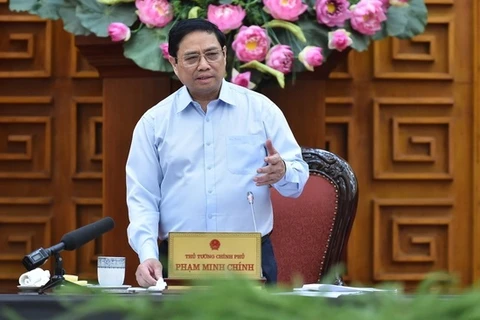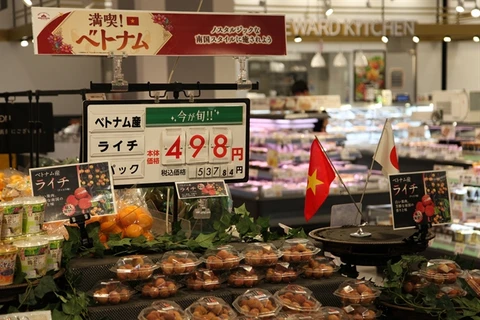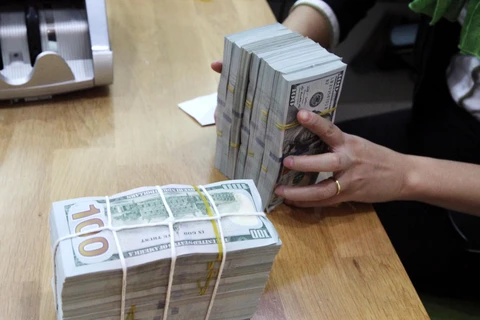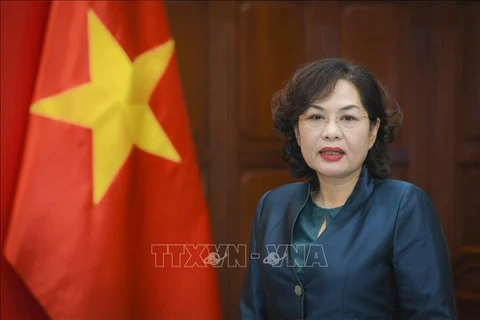Hanoi (VNA) - The US Federal Reserve (Fed) 's latest interest rate hike is expected to have a limited impact on Vietnam's economy, and companies exporting goods to international markets will gain advantages, according to experts.
Fed policymakers on September 21 lifted the benchmark overnight lending rate by 0.75% to a range of 3% to 3.25%.
The move is part of efforts to fight inflation in the US, which hit a 40-year high of 9.1% in June.
According to a representative of Tiross Vietnam Joint Stock Company, which imports household appliances worth 3.5 million USD each year, although the value of US dollars in the international market has increased sharply, the USD/VND exchange rate in Vietnam is relatively stable, so the Fed's hike does not have much impact on the enterprise's import plan.
"The stability of the Vietnamese dong has helped businesses feel more secure because a fluctuation in exchange rate means businesses have to pay more when importing goods, resulting in higher product costs and affecting the profits of enterprises," said Nguyen Dang Hoan, the company's president.
According to a representative of the Vietnam Leather, Footwear and Bags Association (Lefaso), although the leather and footwear industry has had good growth in the European and American markets since the beginning of this year, inflation and the Fed's interest rate hikes may affect purchasing power in these two key markets at the year-end.
Nguyen Minh Tuan, a Huu Nghi International Investment Company analyst, said the Fed's move will affect many commodity groups in Vietnam, especially those that import raw materials from foreign markets.
According to Tuan, the commodity market is often susceptible to interest rates because it relates to capital, inventory, and risk management costs. Some groups of commodities like animal feed and fuels that Vietnam imports raw materials in large volumes, so any fluctuation in the exchange rate can affect input costs for manufacturing companies, negatively impacting their business results.
However, the Vietnamese dong remains relatively stable, sticking to the target of depreciating by 3% this year thanks to the flexible management measures of the State Bank of Vietnam (SBV), experts said.
Hoang Van Cuong, Vice Rector of National Economics University, said it is necessary to maintain the current monetary policy to keep inflation low.
Can Van Luc, a member of the National Financial and Monetary Policy Advisory Council, agreed that good coordination between monetary and fiscal policies is needed to ensure effective control of the exchange rate and inflation.
According to experts, the Fed's decision will have little impact on the banking system because the SBV had prepared for the surge, but the pressure to raise interest rates is huge.
Truong Van Phuoc, former Chairman of the National Financial Supervisory Commission of Vietnam, said that normally higher interest rates reduce demand for goods and services, thus lowering demand for credit in countries with high inflation. On the other hand, raising interest rates will calm the labour market, which is too "hot". In addition, an interest rate hike causes the domestic currency to appreciate while the exchange rate declines.
According to Dr Vu Dinh Anh, the pressure to raise interest rates in Vietnam is great as the country suffers the impact of both the Fed's interest rate hike and the rising demand for credit from businesses.
Currently, Vietnam still advocates keeping interest rates and exchange rate stable.
The pressure forced Vietnam to choose either keeping the interest rate stable or the exchange rate stable, he said, adding that this would immediately affect national economic growth as well as the inflation issue of Vietnam.
The imbalance between capital mobilisation and lending reached 7% and put a lot of pressure on the interest rate increase, Anh said./.

























